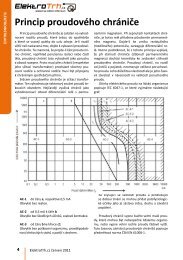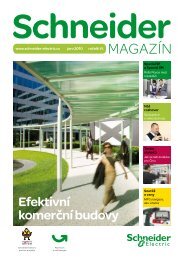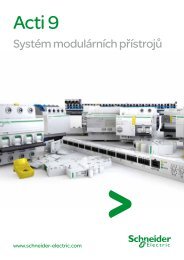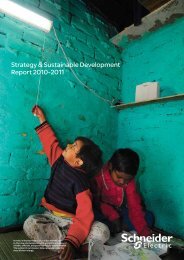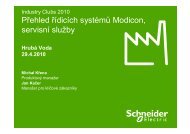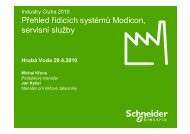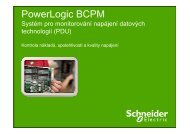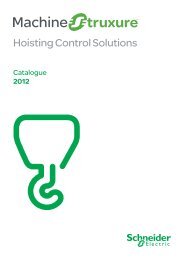2010Annual Report - Schneider Electric CZ, s.r.o.
2010Annual Report - Schneider Electric CZ, s.r.o.
2010Annual Report - Schneider Electric CZ, s.r.o.
Create successful ePaper yourself
Turn your PDF publications into a flip-book with our unique Google optimized e-Paper software.
4. 4 Global, selective purchasing<br />
Purchases correspond to around 50% of consolidated revenue<br />
and play a crucial role in the Group’s technical and business<br />
performance. The Group has globalised 70% of purchases from<br />
strategic suppliers and aims to increase local sourcing in emerging<br />
markets to more than 50% as part of its program to re-balance<br />
costs and revenue.<br />
<strong>Schneider</strong> <strong>Electric</strong> primarily purchases raw materials such as silver,<br />
copper, aluminum, steel and plastics, as well as components,<br />
> 5. Risk factors<br />
DESCRIPTION OF THE GROUP, AND ITS STRATEGY, MARKETS AND BUSINESSES<br />
RISK FACTORS<br />
Risk factors related to the Company’s business<br />
The Group operates worldwide, in competitive<br />
and cyclical sectors<br />
The worldwide markets for the Group’s products are competitive<br />
in terms of pricing, product and service quality, development and<br />
introduction time and customer service. The Group faces strong<br />
competitors, some of whom are larger or developing in certain<br />
lower cost countries. It is exposed to fl uctuations in the economic<br />
growth cycle and to the respective levels of investments of the<br />
different countries in which it is present. The Group’s widespread<br />
geographic coverage and diversifi ed end markets enable it to ride<br />
downturns on specifi c markets.<br />
As the Group records more than one-third of its revenue in emerging<br />
or developing countries, it is exposed to the risks associated with<br />
those markets.<br />
The Group’s wide international presence exposes it to many<br />
economic, legal and political risks in its host countries. These<br />
include risks arising from social unrest (particularly, strikes and walkouts),<br />
political instability, unforeseen regulatory changes, restrictions<br />
on capital transfers and other obstacles to free trade, and local<br />
tax laws, all of which may have an adverse effect on the Group’s<br />
business, results of operations or fi nancial position.<br />
<strong>Schneider</strong> <strong>Electric</strong> has implemented procedures designed to<br />
protect it as far as possible from these risks, which are generally<br />
beyond its control, and to manage them as effectively as possible.<br />
These procedures include quarterly business reviews in which<br />
performance and projections are monitored, in terms of activity,<br />
action plans, results to date and forecasts, at all organisational levels<br />
of the Group (see the section entitled “Internal Control and Risk<br />
electronic products and services. The supplier list includes<br />
international fi rms, as well as many small and medium-sized<br />
companies. Suppliers are selected for their know-how, the quality<br />
of their products and services, their competitiveness, their ability to<br />
support the Group’s globalisation approach and their compliance<br />
with environmental and human rights requirements. As a supporter<br />
of the United Nations’ Global Compact, the Group encourages<br />
suppliers to join as well. A sustainable development agreement sets<br />
out each party’s specifi c commitments.<br />
Management”). The Group also has the necessary competencies<br />
to manage these risks, mainly through its central functions (fi nance,<br />
legal, tax and customs).<br />
The protection provided by these measures may nevertheless<br />
prove to be inadequate.<br />
The growth and success of the Group’s<br />
products depend on its ability to develop new<br />
products and services and adapt to market<br />
and customer needs<br />
The sectors in which the Group operates experience rapid<br />
and signifi cant changes due to the introduction of innovative<br />
technologies. Introducing new technology products and innovative<br />
services, which <strong>Schneider</strong> <strong>Electric</strong> must do on an ongoing basis<br />
to meet customers’ needs, requires a signifi cant commitment to<br />
research and development, which may not result in success. The<br />
Group’s revenue and margins may suffer if it invests in technologies<br />
that do not function as expected or are not accepted in the<br />
marketplace or if its products, systems or service offers are not<br />
brought to market in a timely manner, become obsolete or are not<br />
responsive to our customers’ requirements.<br />
To meet these challenges, the Group has an R&D budget which,<br />
at 4 to 5% of revenue, is among the highest in the industry. R&D<br />
and forward-looking engineering involves some 8,600 employees<br />
around the world, a number of them in development centres located<br />
in over 25 countries. This ongoing commitment has allowed the<br />
Group to accelerate time to market and leverage the technology of<br />
strategic partners with whom it has also forged alliances to expand<br />
2010 REGISTRATION DOCUMENT SCHNEIDER ELECTRIC 37<br />
1




